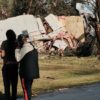The head of the RCMP says police have been “very patient” so far with the Wet’suwet’en hereditary chiefs and their supporters who are opposing a pipeline in northern British Columbia.
Earlier this month, the RCMP, which acts as the provincial force in B.C., enforced a court injunction against those preventing contractors from accessing the construction area for the Coastal GasLink project, which would carry natural gas from near Dawson Creek to a coastal LNG Canada export terminal in Kitimat.
“The discussions for us are always not if we’re going to enforce an injunction, it’s how we’re going to enforce it and when we’re going to enforce it so we can get the most peaceful outcome,” Commissioner Brenda Lucki told a House of Commons committee Thursday morning.
“And that’s exactly what happened. We were very patient. It took several days and we cleared the [Morice West Forest Service Road] road…. We have the discretion of a couple of things in an injunction, mostly about the timing and the intensity. So we can decide when and how we will enforce it even though the injunction is in place.”
The head of the national police force said dialogue continues between the B.C. RCMP and the chiefs.
“We have a specific policy that we have created specifically for Indigenous blockades,” she said. “Of course, enforcement is the last option.”
Lucki’s Thursday morning appearance before the Commons national security committee comes ahead of a proposed meeting between the Wet’suwet’en hereditary chiefs, the federal government and the British Columbia government following weeks of simmering tension.
MP asks whether blockades constitute terrorism
Last week, the RCMP in British Columbia moved its officers out of an outpost on Wet’suwet’en territory to a nearby detachment in the town of Houston.
The hereditary chiefs of the Wet’suwet’en Nation have said they would not meet until the RCMP leave their traditional territory entirely and the pipeline company ceases work in the area.
Public Safety Minister Bill Bair has said the people who live there have a right to be protected by police.
“I think there’s a very important principle: There are thousands of Canadians that live in that area [that] are entitled to policing services,” Blair said.
WATCH: Blair says blockades are not terrorism
“They are entitled, as every Canadian is, to be served and protected by a police service, and that’s what takes place in all parts of Canada including in British Columbia.”
At one point during the morning committee meeting Conservative MP Doug Shipley questioned whether the rail blockades in Quebec and Ontario constitute acts of terrorism, which could allow the RCMP to intervene.
Protesters set tires on fire and tossed them onto the track Wednesday near Belleville, Ont., as CN Rail trains rolled by. Freight trains often carry flammable chemicals and petrochemical products.
“I would not leap to that determination but leave it to the police and to our prosecutes to determine whether or not any conduct meets a threshold of that criminality,” responded Blair, adding that he was concerned by what he saw.
Credit: Source link











